#masjid annabawi
Photo
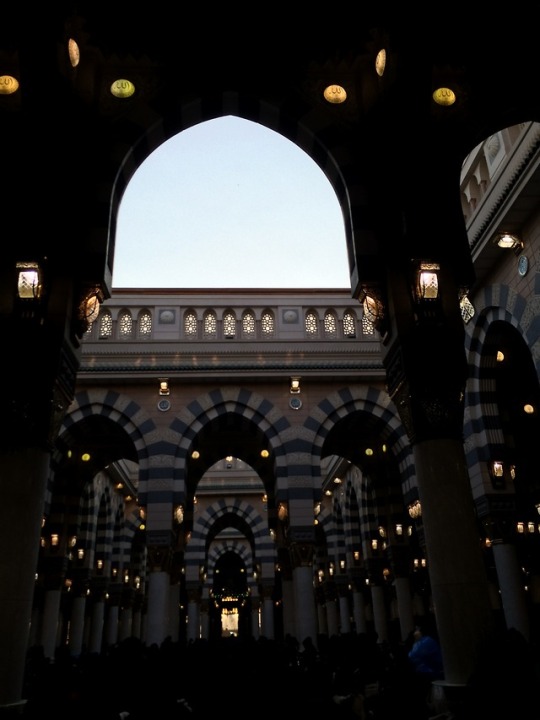
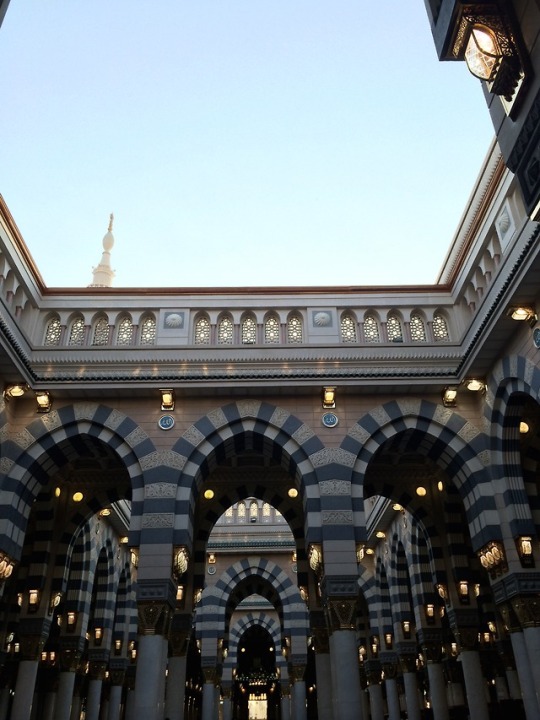
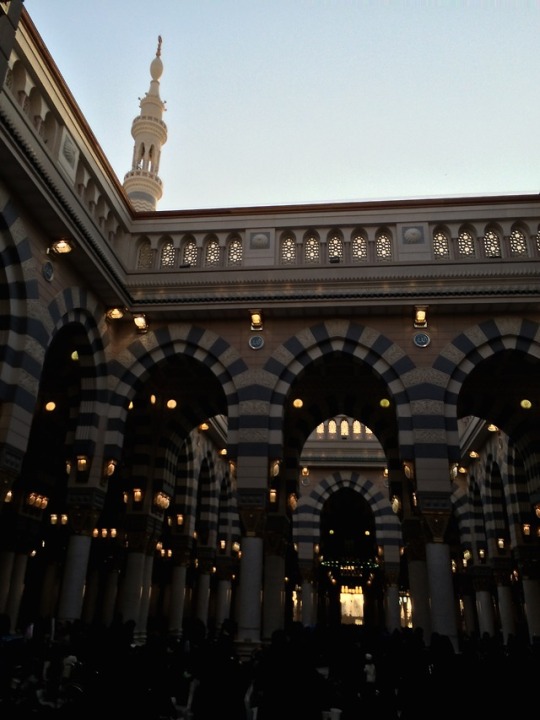
Morning of Eid ulAdha right before the Eid Prayer, Masjid anNabawi, Madinah
Photos taken October 4, 2014, 6:50am.
#eid#medina#saudi arabia#beautiful#aesthetic#architecture#islam#muslims#light#islamic architecture#madinah#masjid annabawi#eid mubarak#pillars#life in madinah#life in saudi arabia#blue sky#alhamdulillah#celebration#travel#culture#religion
2K notes
·
View notes
Text
pahala umroh
Pahala umroh itu sangat menarik karena 1x sholat di masjidil haram sama dengan 100.000 x rekaat. dan sholat di annabawi 1x sholat sama dengan 1000 rekaat kita sholat di masjid yang lain.
Dengan perhitungan yang demikian kalo dibandingkan dengan 70 x saat ramadhan maka sungguh dahsyat pahala umroh. jika kita berkunjung ke baitullah dengan penuh berkah semua dosa dihapuskan, biaya dikembalikan dengan berlipat-lipat.
info dan pendaftaran wa 085208708080
1 note
·
View note
Photo

Sanctity of Qalbun Saleem, a reflection noted from Masjid AnNabawi back in 2015💕by interacting with a beautiful mother seeking peace through her anxieties while raising her precious daughter with special needs. (at Madina Therapy, LLC) https://www.instagram.com/p/BqAJEjTgvMF/?utm_source=ig_tumblr_share&igshid=wrhkraf1c3j8
1 note
·
View note
Text
Kanit Binmas Polsek Neglasari tingkatkan silaturahmi dengan Polmasjid
Kanit Binmas Polsek Neglasari tingkatkan silaturahmi dengan Polmasjid
[email protected] – Perwujudan Polisi Cinta Masjid (Polmasjid) hadir dalam salah satu kegiatan Bhabinkamtibmas Polsek Neglasari yang berbaur dengan masyarakat melaksanakan Shalat Jum’at.
Kanit Binmas Polsek Neglasari Iptu Sapuan, SH didampingi Bripka Marhadi Binmas Kelurahan Kedaung Wetan shalat Jum’at bersama warga Kedaung Wetan di Masjid Annabawi, Jalan AMD, Kedaung Wetan,…
View On WordPress
0 notes
Text
SILVER LININGS Rising above the Storm by YASMIN MOGAHED
Location : Masjid Wilayah Persekutuan, Malaysia Time : 6pm - 10.30pm *May this ilm benefit us all insyaAllah. *copying must put the credit. tq 1. Navigating through a storm - it's not just about keeping us from drowning - but also to use the storm to thrive - to become better, to be stronger - to grow through trials - so you are more prepared for the next storm. 2. Life is not perfect - some people see trials negatively but actually it is positive - while life is not perfectly good but realise that life is also not perfectly bad - What it means is when something is wrong, it's not all bad. 3. Many people have the tendency to focus only on what went wrong that we are missing what is good. There was this image about a boy who smiled ear to ear with one slice of cake. And there is another image of a boy crying with whole cake because one slice of the cake is missing. It all depends on what you focus on. 4. Innama'al 'usri yusro. For one hardship there are many eases. No one is ever tested in everything. Allah gives many other eases when there is one hardship. 5. It's all about focus. Whatever you focus on, it will grow. If you are thankful Allah will increase you. If you focus on what you don't have and the negativity, it will surround you and grow even more. 6. So be careful about what you choose as your focal point. 7. When you go to a creation with empty (nothing) inside, you expect to be filled. You will be like beggars. 8. Most people are irritated by beggars. Begging will turn people away from you. Stop going to creation empty. Go to Allah empty. 9. Why do bad things happen to good people ? - actually bad things never happen to good people. - The matter of the believer is amazing, everything that happened to him is good. (Hadith) - It depends on how you interprete good and bad - This concept empowers you because no one has the ability to harm you because you see good in everything (do not mistaken this with not doing anything to correct wrongs) 10. 99% of the time we interpret good or bad through the lense of dunya. - Qarun had so much wealth. He was so wealthy that the key to his wealth was wealth. - He love to show off and people wanted to be rich like him - some people advised him to be grateful but he said I got this from a knowledge in me. - He was destroyed, swallowed by the earth. - Wealth was actually bad for him. - Those people who earlier wished they have what he had later said thank goodness we didnt have what he had 11. Things are not always what it seems. Refer the story of Musa and Khidir a.s in surah Al Kahfi. Few things that khidir a.s did seems like bad things which actually are good. 12. It maybe you hate something, but it's good for you. Maybe you love something but it's bad for you. Allah knows and you dont. (Quran) 13. Sometimes we are like a child who wants to hold on to the knife. When the knife is taken away, a child threw tantrum not knowing that the knife that was taken away from him is good for him. 14. Do not get it wrong. If someone is mistreating you, you should do something about it, take action to stop it. Sabr is not being passive. Sabr includes actions. Part of worship is taking action against injustice. But you do not despair over decree of Allah. That is Sabr. 15. How can you tell the difference btwn a test and punishment ? The answer is easy. What was your response ? Did the event / incidence bring you closer to Allah or further away from Allah. 16. Refuge to stay strong - How solid is my inner refuge ? - How do you build the inner refuge ? - By building brick by brick to prepare you for refuge. 17. A believer may feel sad, experience pain but a believer never lose hope. It is ok to feel sad but dont despair, do not lose hope on Allah swt. 18. The way to heal is not to suppress it. A lot of culture teach that if you are in pain, just stop crying. Just use a bandage to cover it. You know what happened when you just cover the gunshot wound. It will get infected and worse till it has to be amputated. 19. Sadness actually is not from syaitan. But despair is. Pretending that you are not sad will not make the problem go away. We must acknowledge the pain. Then turn to Allah on that pain with hope. Nabi yunus a.s. never lose hope. We should always have hope in the mercy of Allah. 20. There is a difference btwn hearing a concept and living a concept. All what we have discussed above is a concept. You need to live with it and apply it. 21. So how do we apply this? - If you want to be able to thrive from the storm, build your refuge every other day before the storm come. - How? 3 things : 1. *Solat* - solat is like oxygen. You will die if you don't have oxygen. The same for your soul. Without solat your soul will die. - Allah prescribed solat at a specific time because He knows we need it. 2. *Azkar* - Rasulullah s.a.w always read du'a in every motion of his life / before doing anything. These du'as are not statement of the tongue, but statement of the heart. - It is living my dunya life but my heart continue to connect with Allah. - Islam is practiced within our mundane life. You are always feeding the heart if you do this. - We are always in a battlefield with the unseen enemy - syaitan - who only want you to suffer. His only goal is to destroy you. When you turn away from remembrance of Allah which is your armour, this enemy will come and become your advisor. When he whispered we thought it was our idea. This enemy doesnt take a day off. That's why collection of duas from rasulullah s.a.w are called fortress of muslims (hisnul muslim). Apps - My duaa. Prophet muhammad saw has du'a for everything in life. 📌There are so many azkar you can make. But this few azkar *you can't live without* to shut the door from syaitan : - morning azkar - evening azkar - before sleep - before eat - when you enter your house - intimacy - bathroom 📌azkar to open doors to goodness : (a) la haula wala quwwata illa billah (b) istighfar (sayyidul istighfar) (c) doa nabi yunus - لا إله إلا أنت سبحانك إني كنت من الظالمين When we have a problem we focus too much on the problem that we forget to find the keys to open door. Azkar is the key. Always keep your heart in constant communication with Allah 3. *Quran* You must have a constant relationship with the book of Allah 💪🏻If you hold down to these 3 things you will never drown and you will be protected from the unseen enemy. 22. How to combat pride / arrogance : - realise that there is no good except from Allah - realise that Allah can take it away to humble you. He can take you to the floor in split second. - never feel you are better than someone else. When you are advising, remember your own flaws and istighfar. Give advise but always remember your own flaws when you do that 23. There are 3 responses when you have a test : (1) Anger - anger with the decree of Allah (why me). We are all human, sometimes we respond this way. When we did, make istighfar and ask Allah to make it easy for you to have patience (2) Patience - Patience does not mean you are being passive and do not take action as explained earlier. It means you are not complaining about the decree of Allah. Rewards of sabr is purification of sin. (Nabi ayyub never stop making du'a to Allah) (3) Redha - contentment. Redha is higher than sabar. Redha is when u see beyond the trial and accept it in gratitude. Reward of redha is your status is elevated by Allah. Some people act like a baby taking an injection when faced with difficulty. All they see is pain. This is anger. Some people act like a teenager taking an injcetion, they still feel the pain but they dont complain to the doc because they understand. This is sabar Few people act like an adult who took an injection by thanking the doc for that. He truly understand that the injection is to save his life. He is so happy and grateful to the doc for the injection. This is redha. 24. Allah said we will surely be tested. (2:155-156) 25. When you are wronged, you dont consider forgiveness because someone deserve or not deserve your forgiveness. You forgive because you want forgiveness of Allah (24: 22) 26. Remember when you are dealing with creations, you are actually dealing with Allah. Dealing with creations with good is actually an act of worship. Dont separate it. 27. The way i treat people is the same as how Allah would treat me. 28. Forgiveness is about me, not about the other person. Forgiveness is about us wanting forgiveness from Allah for ourselves. 29. Being good to people and forgiveness is actually a fast track to the mercy and aid of Allah in all trials that you face. 30. To help a brother in need is more beloved to the Prophet s.a.w. than to do iktikaf in Masjid anNabawi for days. (Hadith) 31. When you remember that everything belongs to Allah, you will act differently upon facing any calamity. 32. Building this refuge / fortress can never be put off because you will never know when your time will end. 33. Whatever fill your heart in your life will come out at the time of your death. - There are people who cant say laa ilaa hailla Allah during their last moment even when the whole family surround them and teach / remind them of the words. There are reports, some even utter numbers, lyrics, calculations. -Be very careful about how you live your life. Only people who have Allah at the centre of their life will be able to say Allah on their tongue during the last second of their life.
1 note
·
View note
Photo

#twicetheblessings#masjid#annabawi#masjid annabawi#prophetsmosque#ksa#saudi#saudiarabia#Allah#islam#muslim#prophet#muhammad#pbuh#sas
51 notes
·
View notes
Note
Please can you write more about life in Madinah? Where can women work? Can we buy a house being a “non-citizen”? Or can we rent a home closely to Masjid Nabawi ? What are the most common vacancies in Madinah for men/women? Apologising for too many questions! I just dreaming to move to Madinah In shaa Allah!
Yes, I really hope to be more active on this blog--I’ve been kinda busy lately even though it’s summer but I’m hoping to be able to write more about life in Madinah in general soon inshaAllah :)
But for now, to answer your specific questions..
Women obviously have to work much harder to get a job than men do, and many times being a Saudi citizen will give you a higher edge to get hired--whether male or female. But many schools, especially international ones, hire native English speakers to teach their classes. There are quite a few international schools in Madinah that teach in English and schools pride themselves on having native speakers as teachers of any subject. But non-English speaking women can often find jobs as teachers as well. Of course the schools there are segregated so I there seems to be a need for female teachers for girls’ schools, especially private ones that don’t require Saudi citizens. There are many female Quran teachers, too, who teach in afternoon programs or even Masjid anNabawi if they have the right qualifications...so yeah, female teachers seem to be the biggest opening for women’s jobs in Madinah at the moment.
Last I knew, no, you cannot buy a home if you are not a Saudi citizen. You can rent if you have legal residency, however, and yes, of course you can choose to live near Masjid anNabawi. I think if you live anywhere within the haram (sanctuary) borders of Madinah you’re 15-20 minutes away from the masjid maximum. Although it’s interesting to note that it seemed to me like the homes closer to Masjid anNabawi seemed to be older and in poorer conditions than the ones further away, maybe because of how everything started being built near the masjid and then newer neighborhoods started being built further away.
About dreaming to move to Madinah--may Allah do what’s best for you 💗 it is certainly not the fairy-tale land that many people might expect it to be, yet it has an indescribable sweetness if you can withstand the struggles that come with it. No place in the world is perfect, but Madinah has a special place in the hearts of everyone who’s stepped foot there 🌸
11 notes
·
View notes
Photo
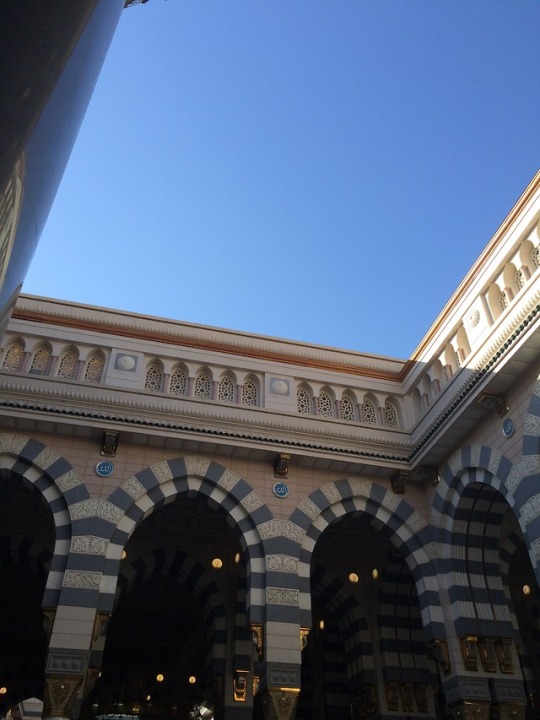

During the day, the domes of Masjid anNabawi slide open to let in fresh air, and the lights are dimmed to let in natural light, making the atmosphere very calming and peaceful.
The rectangular lights on top of the pillars, beneath the arches, are decorated with a beautiful part of an ayah:
“Allah is the light of the heavens and the earth...”
Photos taken on April 2, 2015, 9:30am.
#masjid annabawi#peace#madinah#saudi arabia#sky#aesthetic#morning#madinah aesthetic#architecture#calm#beautiful#light#islam#muslims#islamic art#islamic architecture#middle east#medina#good morning#design#beauty#simplicity#good vibes
20 notes
·
View notes
Text
The Female Scholars of Masjid anNabawi (the Prophet’s Mosque) in Madinah
Many people already know that Masjid anNabawi (also referred to as the Haram) has male scholars, imams, and teachers. But did you know that it also has many female scholars, teachers, and reciters as well?
The Haram offers free daily halaqas (”circles,” aka classes) for anyone and everyone, the most common ones teaching the recitation (tajweed) and memorization (hifth) of Quran. There are several halaqas that run every day at different times--in the morning, between Asr and Maghrib, and between Maghrib and Isha. Anyone with an iqaama (ID proving lawful residence in Saudi Arabia) can sign up, and they’re not just in Arabic--there are English and Urdu ones, as well. And for the thousands of visitors that don’t have iqamas, there are many lectures and opportunities to recite to a teacher without signing up for an actual class. There are also newly offered online classes, as well. All of these are taught by people who’ve memorized the Quran and have possibly completed other courses of study as well. And these teachers are not just men, they’re women, too.
Men teach other men/boys in the men’s section, and women teach other women/girls/young boys in the women’s section.
And they’re not just halaqas, or classes--there are also designated times and places throughout the women’s section where a female scholar would come and answer any questions women may have. These scholars often speak multiple languages in order to communicate with the Muslim women from all over the world.
Some of them even use sign language! When a group of women with hearing loss visited from Canada, the office for the women’s section sent a scholar who signs to introduce them to the Haram and lead them to Rawdah. There are also halaqas to teach Quran led by women for women and children with special needs--there is an effort to encourage students with hearing loss, blindness, down syndrome, or other difficulties to learn the Quran as well.
While the (male) Imams of the Harams (both in Madinah and Makkah) get a lot of attention and praise worldwide about their beautiful recitations of the Quran, many don’t realize, or overlook, that there are also highly qualified female reciters with beautiful voices, as well. It’s just impossible for the whole world to know, as they tend to only recite in the presence of women or male relatives, out of modesty.
I remember listening to one of my teachers’ beautiful recitations inside the Masjid--it was so serene and peaceful that birds would come stand near her on the carpets. She recited with such a strong voice that it carried into the men’s section, so the men’s office called the women’s office to ask her to recite more quietly or to sit further away from the barrier between the sections as it was distracting the other men.
Here, I say “scholar,” but these women often don’t refer to themselves as such, out of humility. Once, when I was in middle school, I asked a woman, who was showing visitors different significant parts of the Masjid and answering their questions, whether she was a scholar or not. She said, “I can’t say that I am a scholar, or else shaytan (the devil) will try to convince me that I already know enough so I don’t have to learn any more. I have a lot left to learn, so I can’t call myself a scholar.”
So although it’s often overlooked, competent Muslim women of knowledge exist and are hard at work every day, some doing it for their own self-fulfillment, some earning money for the families, and all of them doing it with love. Nevertheless, it’s hard to frequently visit the women’s section of Masjid anNabawi without witnessing the impact of these amazing female role models.
6-10-2018
#female scholarship#teachers#brave scholar#masjid annabawi#masjid#haram#islam#muslims#muslim women#strength#quran#halaqa#prophets mosque#madinah#makkah#saudi arabia#free education#education#prayer
214 notes
·
View notes
Photo

Map of Madinah, 1914
I found this from the Library of Congress! As you can see, it’s in German, but if you look closely you can recognize some words like “Bab Kuba” (Gate of Quba) in the southwest, “Masdjid Umar” a little north of that, and “el Baki” (Al-Baqee’) in the east. If you zoom in on the Haram (the rectangle near the center), you’ll see the label for “Bab el Salam,” a gate of Masjid anNabawi that still exists today, and also “Haus des Scheich el Haram” which means “House of the Shaykh of the Haram.”
#this is so cool!!!#medina#madinah#history#islamic history#masjid annabawi#1900s#library of congress#maps#old photos#german#ww1#masjid quba#saudi arabia#middle east#middle eastern history
8 notes
·
View notes
Text
Madinah-Made Gift Shop

Photo taken December 1, 2016
This is in front of the courtyard of alMasjid anNabawi, and the store also has branches in front of Masjid Quba, Masjid Qiblatayn, and I believe they might be opening one in front of Jabal Uhud.
From this photo’s perspective, the Masjid is to the right. Because the people are walking in that direction, it seems like this photo was taken close to a prayer time--they’re on their way to pray!
This shop has prayer rugs, hijabs, abayahs, keychains, bags, and other cute things. It tends to be pricier than other stores in the surrounding malls, but the fact that it guarantees its products were made in Madinah attracts many, including me!
Do you notice the hotel building behind it? It’s called “Dar Al Taqwa Hotel,” or “the House of Piety Hotel.” Many buildings/hotels in Madinah and Makkah are named after important things in Islam--for example, the Zamzam Towers or the Tower of Forgiveness in Makkah. In my opinion, they sound better in Arabic, to be honest :)
#madinah#makkah#gift shop#masjid annabawi#tourism#tourists#muslims#saudi arabia#middle east#islam#prayer time#prayer#authentic#hotel#shopping#hijab#masjid#arabic#gifts#travel#religion#pilgrimage#umrah#hajj
19 notes
·
View notes
Photo

Photo taken exactly 4 years ago today: September 8th, 2014!
The courtyard of al-Masjid an-Nabawi between the Asr and Maghrib prayers.
The umbrellas open when the weather is too hot, sunny, or raining.
#masjid annabawi#madinah#saudi arabia#medina#middle east#muslims#prophets mosque#cotton candy clouds#clouds#blue sky#pink clouds#cotton candy#people#diversity#islam#prophet muhammad#umbrellas#weather#المسجد النبوي#المدينة المنورة#الحرم#المملكه_العربيه_السعوديه
3 notes
·
View notes
Text
Enter with Peace <3
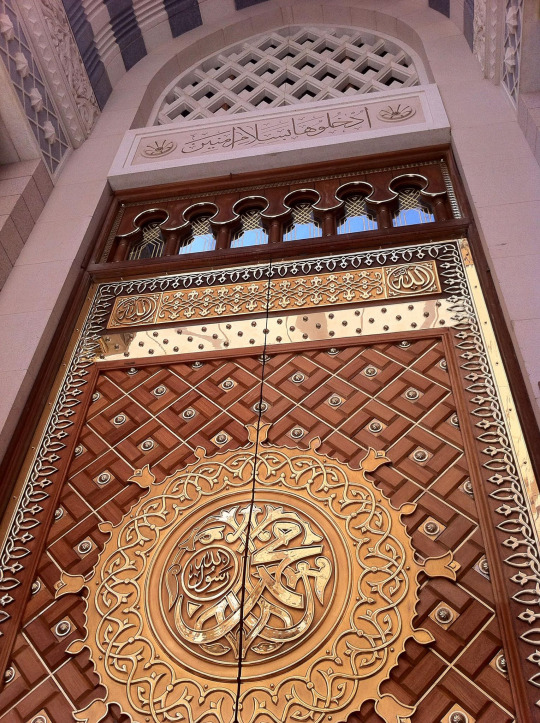
Photo taken January 31, 2014
Close-up shot of a closed door of Masjid anNabawi, intricately designed with wood and metal
At the very top rectangle is one of my favorite ayahs from the Quran (15:46), which translates to “Enter it in peace and security,” something that will be sweetly said to the people entering Jannah <3
"Muhammad, Messenger of Allah” is beautifully written in calligraphy in the circle at the bottom of the photo.
All of Masjid anNabawi’s main doors have the same design. You usually won’t see closed doors--all doors are almost always open during the day, unless it’s not umrah or hajj season and there are less people than usual.
#design#beautiful#islamic art#architecture#islamic architecture#peace#security#muhammad#pbuh#masjid annabawi#masjid an-nabawi#madinah#saudi arabia#islam#muslims#quran#calligraphy#arabic#jannah#umrah#hajj#love#aesthetic#peaceful#art#doors#middle east#masjid#prophet
6 notes
·
View notes